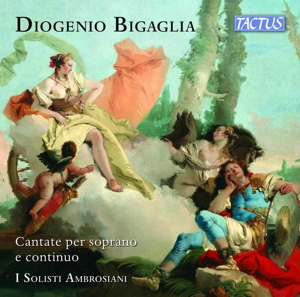
Diogenio Bigaglia (1678-1745)
Cantate per soprano e continuo
I Solisti Ambrosiani
Recording details not provided
Texts without translations available from Tactus website
Tactus TC670203 [69]
In the course of about 35 years of reviewing discs with early music, the disc under review here is only the second with music by Bigaglia that has crossed my path. The first was a recording of some of his sacred music, which was released by Rondeau in 2018 (review). Bigaglia is very much a neglected composer, who may have suffered from being a contemporary of more famous Venetian colleagues, such as Vivaldi and Albonini. Another factor is that we know not that much about him. It is telling that in my edition of New Grove the article on him comprises just five lines. However, there is more to tell about him than is on offer there, as the liner-notes to the Tactus disc show, which also include several corrections to the information in New Grove.
His name appears in different forms in the various sources: he is also called Padre Bicajo or Bigaja. The addition Padre indicates that he was a man of the church. Antonio Bigaglia was born into a glassworker’s family in Murano, one of the Venetian islands, which is famous for its glassmaking history. In 1694 he joined the Benedictine Order at the Convent of San Giorgio in Venice, where he was ordained a priest in 1700 and became prior in 1713. His name changed from Antonio to Diogenio, and that it is the name under which he was known.
Bigaglia’s involvement in music is remarkable, as he belonged to the Cassino branch of the Benedictine Order, which was known for its strictness. Even so, his musical activities received praise from his congregation. A contemporary calls him a “highly learned man”; this may have been inspired by his music, but also his reputation as a theorist. His oeuvre comprises sacred music, secular cantatas and some instrumental music. He has become best-known for his sonatas Op. 1, scored for violin or recorder. His vocal music has been hardly recorded, and the secular cantatas which are the subject of the present recording, almost certainly appear on disc for the first time.
It is a big shame that the lyrics come without any translations. That makes it impossible for everyone who does not understand Italian to know how Bigaglia has treated the texts of his cantatas. All of them are about love, and especially the trials and tribulations of it, as the liner-notes mention. Several of them include the names of Thirsis and Phyllis, and any lover of this kind of music will immediately recognize them as characters from the imaginary world of Arcadia, the ideal of the higher echelons of society in the baroque period. Such cantatas were often performed in gatherings of the academies, which existed in many Italian cities. The scoring for a single voice – usually soprano or alto – and basso continuo points in the direction of a performance in an intimate environment. From that angle I would have preferred a more intimate recording; there is just a little too much space around the performers.
Most cantatas consist of two pairs of recitative and aria; two omit the opening recitative. I like the way Tullia Pedersoli treats the recitatives. In many recordings their rhythm is observed too strictly. They require a declamatory approach, in which the rhythm of the text is leading, and that is exactly how Tullia Pedersoli sings them. I also appreciate her ornamentation: she shows some restraint in that she avoids rewriting entire lines in the dacapos – a bad habit of many singers these days. She has a very nice voice; I did not know her, and I hope to hear more from her. Here and there she uses a bit more vibrato than is justified, but overall it did not bother me that much. And considering that Bigaglia’s music is hardly known, this is a disc any lover of baroque vocal music, who likes to expand his/her horizon, should investigate. Claudio Frigerio (cello) and Serena Agostini (harpsichord) are the perfect partners of Tullia Pedersoli.
Johan van Veen
www.musica-dei-donum.org
twitter.com/johanvanveen
Help us financially by purchasing from



Contents
Ah, Santi Numi
Aure dolci, erbe molli, ameni fiori
Bel piacer d’un amante
Dove vai mio ben crudele
Ecco perfida Irene
Erano ancor immote
Filli, che vedo o cieli
Gran crudeltà di stella
Non lasciarmi o bella speme


















